英语动词四大分类讲解
英语中动词归类总结

英语中动词归类总结动词的定义: 动词是表示动作或状态的词。
例如: work,工作 , study,学习,eat 吃。
动词的分类:动词有两种分类方法。
1)限定动词和非限定动词。
限定动词在句中作谓语,有人称和数的变化。
非限定动词有动词不定式,动名词和分词三种。
在句中不能单独作谓语,没有人称和数的变化。
2)实义动词,连系动词,情态动词和助动词。
实义动词有完整的词义,并能单独作谓语,实义动词又可分为及物动词和不及物动词。
例如:study 学习, reach 到达, see 看见, rise 升起。
连系动词在句中作谓语动词,后面跟表语。
连系动词有 be, seem, look, become, get, grow, feel, appear, remain, turn。
情态动词表示能力,义务,必要,猜测等说话人的语气或情态。
情态动词只能和动词原形一起构成谓语动词。
情态动词有can, will, have, be, should, do, would, 等。
助动词只能和主要动词一起构成各种时态,语态和语气等动词形式。
do, shall, will, have, has.动词的基本形式。
英语动词有四种基本形式:动词原形,过去式,过去分词和现在分词。
这四种动词形式和助动词一起构成动词的时态,语态和语气。
动词的原形。
就是词典中所给的形式。
例如:be, have, buy, sit.动词过去式和过去分词的构成有规则的和不规则的两种形式。
规则动词的过去式和过去分词,由在原形动词的后面加词尾 -ed 构成。
work - worked - worked不规则动词的过去式和过去分词的形式是不规则的,须要一一记忆。
go - went - gone do - did - done动词的现在分词由动词原形加 -ing 构成。
构成方法如下:1)一般情况在动词原形后加 -ing 。
go---going stand---standing2)以不发音的 e 结尾的动词,去掉 e ,再加 -ing. 动词是闭音节的单音节词,或是以重读闭音节结尾的多音节词,而末尾只有一辅音字母时,这个辅音字母须双写,然后再加 ing。
英语中动词的分类[1]
![英语中动词的分类[1]](https://img.taocdn.com/s3/m/fbb1c90c0740be1e650e9aba.png)
英语中动词的分类1)表示动作中状态的词叫做动词。
2)根据其在句中的功能,动词可分为四类,分别是:实义动词(Notional Verb)、系动词(Link Verb)、助动词(Auxiliary Verb)、情态动词(Modal Verb)。
说明:有些情况下,有些动词是兼类词,例如:We are having a meeting.我们正在开会。
(having是实义动词。
)He has gone to New York.他已去纽约。
(has是助动词。
)3)动词根据其后是否带有宾语,可分为两类,分别是:及物动词(Transitive Verb)、不及物动词(Intransitive Verb),缩写形式分别为vt.和vi.。
**英语动词是句子的核心。
它既决定着句子意思的表达同时又决定着句子的语法结构。
难怪有人说,英语是动词和介词的语言。
可见研究动词的用法在英语学习中是十分重要的。
(一、) 分清及物不及物:分清动词的及物不及物是在英语学习中必须解决的首要问题。
动词及物与不及物通常有以下几种情况:a.主要用作及物动词。
及物动词后面必须跟宾语。
可以用于:"主+谓+宾";"主+谓+双宾";"主+谓+宾+宾补"结构。
如:He reached Paris the day before yesterday.Please hand me the book over there.They asked me to go fishing with them.类似的还有:buy, catch, invent, found, like, observe, offer, prevent, promise, raise, find, forget, receive, regard, see, say, seat, supply, select, suppose, show, make, take, tell....b.主要用作不及物的动词。
英语动词的四大分类
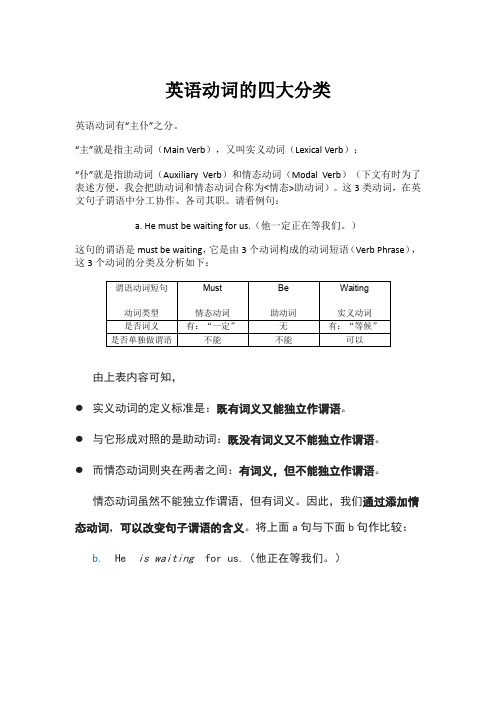
英语动词的四大分类英语动词有“主仆”之分。
“主”就是指主动词(Main Verb),又叫实义动词(Lexical Verb);“仆”就是指助动词(Auxiliary Verb)和情态动词(Modal Verb)(下文有时为了表述方便,我会把助动词和情态动词合称为<情态>助动词)。
这3类动词,在英文句子谓语中分工协作、各司其职。
请看例句:a. He must be waiting for us.(他一定正在等我们。
)这句的谓语是must be waiting,它是由3个动词构成的动词短语(Verb Phrase),这3个动词的分类及分析如下:由上表内容可知,●实义动词的定义标准是:既有词义又能独立作谓语。
●与它形成对照的是助动词:既没有词义又不能独立作谓语。
●而情态动词则夹在两者之间:有词义,但不能独立作谓语。
情态动词虽然不能独立作谓语,但有词义。
因此,我们通过添加情态动词,可以改变句子谓语的含义。
将上面a句与下面b句作比较:b.He is waiting for us.(他正在等我们。
)a句有情态动词must,使得句子有推测含义,表明“他正在等我们”不是百分百确定的,只是我们的猜测;而b句没有情态动词,则是百分百确定“他正在等我们”,是在陈述事实。
助动词虽然不能独立作谓语(只能构成谓语的一部分),也没有词义,但是它依然对谓语意思有影响。
比如助动词be帮助构成进行时态,如a、b句中的be waiting/is waiting。
请比较:c.He often waits for us.(他经常等我们。
)c句只有实义动词waits,没有情态动词和助动词,此时既没有推测含义,也不能表示“正在等”,而只能表达一种习惯。
总之,a、b两句是在谈论他现在的状况——他(一定)正在等我们,而c句未必是在谈论他现在的状况(与现在他是否在等我们无关),主要是表达一种习惯。
搞清楚了实义动词、助动词和情态动词的关系之后,现在有这么一个问题:我们常说的系动词(Linking Verb)与这三类动词是什么关系呢?是并列关系还是包含关系?若是包含关系,那么应该归为哪一类?实际上,系动词是实义动词下面的一个分支,具体分类如下:动词的分类体系我看到很多语法书把系动词与实义动词、助动词、情态动词并列起来,认为动词有这四类,其实这样分类是不合理的(甚至可以说是错误的)。
英语动词分类大全
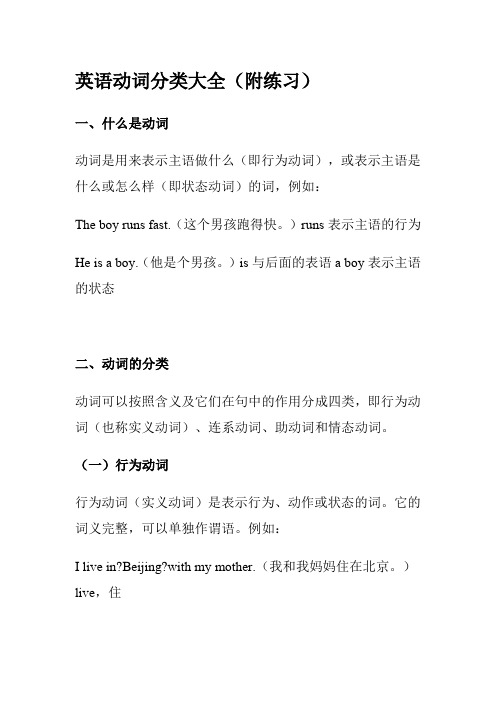
英语动词分类大全(附练习)一、什么是动词动词是用来表示主语做什么(即行为动词),或表示主语是什么或怎么样(即状态动词)的词,例如:The boy runs fast.(这个男孩跑得快。
)runs表示主语的行为He is a boy.(他是个男孩。
)is与后面的表语a boy表示主语的状态二、动词的分类动词可以按照含义及它们在句中的作用分成四类,即行为动词(也称实义动词)、连系动词、助动词和情态动词。
(一)行为动词行为动词(实义动词)是表示行为、动作或状态的词。
它的词义完整,可以单独作谓语。
例如:I live in?Beijing?with my mother.(我和我妈妈住在北京。
)live,住It has a round face.(它有一张圆脸。
)has,有(二)连系动词连系动词是表示主语“是什么”或“怎么样”的词,它虽有词义,但不完整,所以不能单独作谓语,必须跟表语一起构成合成谓语,例如:We are in Grade Two this year.(今年我们在两年级。
)are,是are?这个词的词义“是”在句子中常常不译出。
连系动词可具体分为三类:1、表示“是”的动词be。
这个词在不同的主语后面和不同的时态中有不同的形式,is,am,are,was,were,have/has been 等要特别予以注意。
例如:He is a teacher.(他是个教师。
)He was a soldier two years ago.(两年前他是个士兵。
)We are Chinese.(我们是中国人。
)2、表示“感觉”的词,如look(看起来),feel(觉得,摸起来),smell(闻起来),sound(听起来),taste(尝起来)等,例如:She looked tired.(她看一去很疲劳。
)I feel ill.(我觉得不舒服。
)Cotton feels soft.(棉花摸起来很软。
)The story sounds interesting.(这个故事听起来很有趣。
2025届高考英语语法复习-动词的分类知识讲解 讲义

高考英语语法复习动词的分类知识讲解cry 哭泣disappear 消失go 走,趋于live 生存,居住rise 上升,增强shiver 颤抖,哆嗦sparkle 闪耀appear 出现decay 衰退exist 存在happen 发生occur 发生,出现roar 咆哮,喧闹sigh 叹息swim 游泳arise 出现,产生deteriorate 恶化fall 落下hesitate 犹豫scream 尖叫sit 坐,位于travel 旅行collapse 倒塌die 死亡flow 流动laugh 笑quiver 颤抖smile 微笑sneeze 打喷嚏lie 躺,位于,说谎age (使)成熟,变老break 打破(记录)close 关闭,结束decrease 减少,减小end 结束,终止grow 种植,生长meet 满足,对付;相遇shake 动摇,发抖spread 散布,铺开,传播stop 断绝,停止widen 加宽,变宽begin (使)开始burn 烧毁,燃烧continue (使)继续double (使)加倍finish 完成,终结improve 改善,加强open 打开,开始show 演示,说明;显示stand 忍受,抵抗;站立tear 撕毁,流泪stretch (使)伸展;使用,消耗boil (使)蒸发,沸腾change (使)改变cook 烹饪,做菜dry 弄干,变干fly 使飘扬,飞行increase 增加run 经营,运转slow 放慢,阻碍,变慢start 启动,出发turn 使旋转,转动。
英语动词及动词分类讲解(打印版)
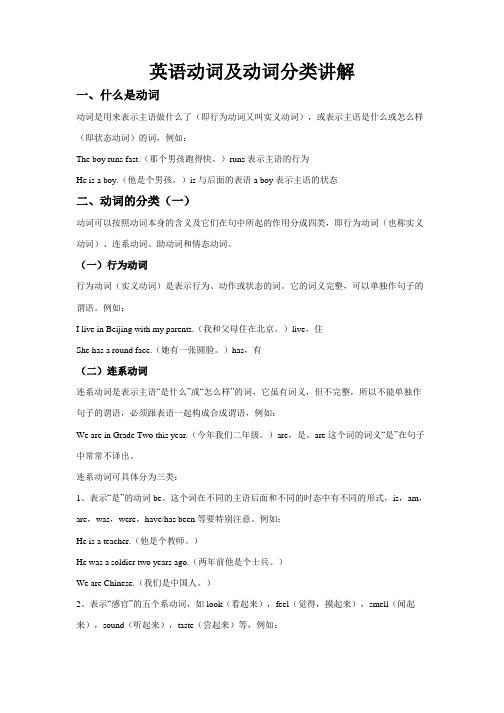
英语动词及动词分类讲解一、什么是动词动词是用来表示主语做什么了(即行为动词又叫实义动词),或表示主语是什么或怎么样(即状态动词)的词,例如:The boy runs fast.(那个男孩跑得快。
)runs表示主语的行为He is a boy.(他是个男孩。
)is与后面的表语a boy表示主语的状态二、动词的分类(一)动词可以按照动词本身的含义及它们在句中所起的作用分成四类,即行为动词(也称实义动词)、连系动词、助动词和情态动词。
(一)行为动词行为动词(实义动词)是表示行为、动作或状态的词。
它的词义完整,可以单独作句子的谓语。
例如:I live in Beijing with my parents.(我和父母住在北京。
)live,住She has a round face.(她有一张圆脸。
)has,有(二)连系动词连系动词是表示主语“是什么”或“怎么样”的词,它虽有词义,但不完整,所以不能单独作句子的谓语,必须跟表语一起构成合成谓语,例如:We are in Grade Two this year.(今年我们二年级。
)are,是。
are 这个词的词义“是”在句子中常常不译出。
连系动词可具体分为三类:1、表示“是”的动词be。
这个词在不同的主语后面和不同的时态中有不同的形式,is,am,are,was,were,have/has been等要特别注意。
例如:He is a teacher.(他是个教师。
)He was a soldier two years ago.(两年前他是个士兵。
)We are Chinese.(我们是中国人。
)2、表示“感官”的五个系动词,如look(看起来),feel(觉得,摸起来),smell(闻起来),sound(听起来),taste(尝起来)等,例如:She looked tired.(她看起来很疲劳。
)I feel ill.(我觉得不舒服。
)Cotton feels soft.(棉花摸起来很软。
动词的分类
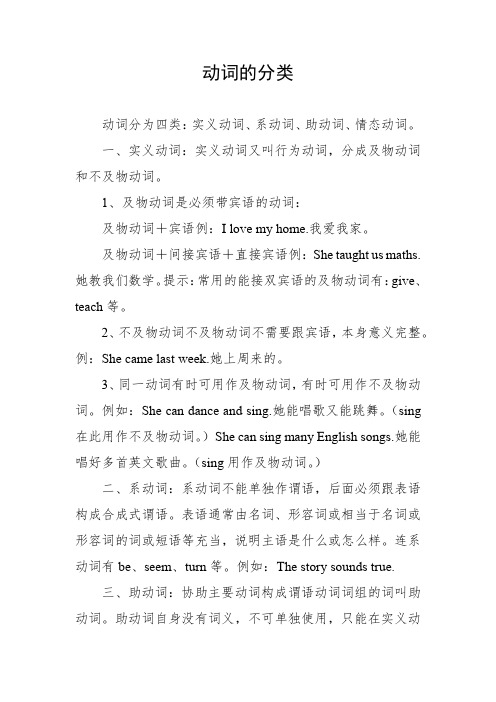
动词的分类动词分为四类:实义动词、系动词、助动词、情态动词。
一、实义动词:实义动词又叫行为动词,分成及物动词和不及物动词。
1、及物动词是必须带宾语的动词:及物动词+宾语例:I love my home.我爱我家。
及物动词+间接宾语+直接宾语例:She taught us maths.她教我们数学。
提示:常用的能接双宾语的及物动词有:give、teach等。
2、不及物动词不及物动词不需要跟宾语,本身意义完整。
例:She came last week.她上周来的。
3、同一动词有时可用作及物动词,有时可用作不及物动词。
例如:She can dance and sing.她能唱歌又能跳舞。
(sing 在此用作不及物动词。
)She can sing many English songs.她能唱好多首英文歌曲。
(sing用作及物动词。
)二、系动词:系动词不能单独作谓语,后面必须跟表语构成合成式谓语。
表语通常由名词、形容词或相当于名词或形容词的词或短语等充当,说明主语是什么或怎么样。
连系动词有be、seem、turn等。
例如:The story sounds true.三、助动词:协助主要动词构成谓语动词词组的词叫助动词。
助动词自身没有词义,不可单独使用,只能在实义动词和系动词前构成谓语的时态、语态以及否定式和疑问式。
它没有对应的汉译,例如:He doesn't like English.他不喜欢英语。
(doesn't是助动词,无词义;like是主要动词,有词义)He is singing.他在唱歌。
(is是助动词,无词义,构成现在进行时)。
四、情态动词:情态动词是一种本身有一定的词义,表示说话人对有关行为或事物的态度和看法,认为其可能、应该或必要等,不能单独作谓语,情态动词后面加动词原形。
常用的情态动词有:Can(could)(能、会)如:I can swim.我会游泳。
高中英语动词分类精华讲解

动词的分类动词种类实义动词连系动词助动词情态动词(重点)及物动词不及物动词状态系动词持续系动词表像系动词感官系动词变化系动词终止系动词Be DoShall WillhaveCan MayMust Have toShall WillNeed dare动词形式动词原形过去式过去分词现在分词一般时过去时完成时、被动语态进行时、动词词一、动词的分类按照动词在句中的作用,英语动词可分为四类;实义动词,连系动词,助动词和情态动词。
1、实义动词(行为动词)实义动词(行为动词)说明动作或状态,能独立作谓语,可分为及物动词和不及物动词。
(1)及物动词及物动词必须接宾语,才能有完整的意思,这可以有三种情况;①动词+宾语Her father enjoys warm tea very much in summer.她的父亲夏天非常爱喝热茶。
②动词+间接宾语+直接宾语(直接宾语是谓语动词的承受者,间接宾语表示谓语动作的方向(对谁做)或动作的目标(为谁做),间接宾语紧接在谓语动词后,但它不能单独存在。
)Did he give you a present yesterday?May I ask you a question?③动词+宾语+宾补They call her "Little Li".他们叫她小李。
They elected Bush president.他们选布什当总统(2)不及物动词不及物动词本身有完整的意思其后不需要跟宾语。
例如:His mother works in a hospital.(介词短语做地点)She stayed at home yesterday.(介短)A. 记住下面这些可带双宾语的动词buy, bring, build, cook, cut, draw, find, hand, get, leave, lend,make, offer pay, pass, read,return, show, sell, tell, teach, write等。
高中英语高考动词分类汇总(共四大类)
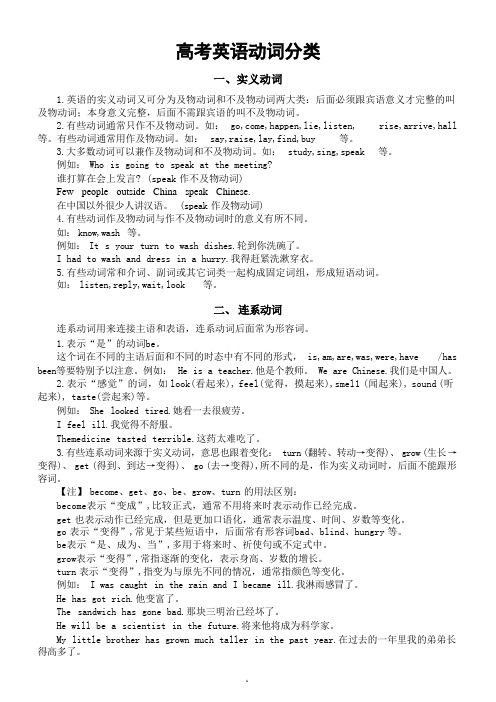
高考英语动词分类一、实义动词1.英语的实义动词又可分为及物动词和不及物动词两大类:后面必须跟宾语意义才完整的叫及物动词;本身意义完整,后面不需跟宾语的叫不及物动词。
2.有些动词通常只作不及物动词。
如: go,come,happen,lie,listen, rise,arrive,hall 等。
有些动词通常用作及物动词。
如:say,raise,lay,find,buy 等。
3.大多数动词可以兼作及物动词和不及物动词。
如:study,sing,speak 等。
例如: Who is going to speak at the meeting?谁打算在会上发言? (speak 作不及物动词)Few people outside China speak Chinese.在中国以外很少人讲汉语。
(speak 作及物动词)4.有些动词作及物动词与作不及物动词时的意义有所不同。
如:know,wash 等。
例如:It s your turn to wash dishes.轮到你洗碗了。
I had to wash and dress in a hurry.我得赶紧洗漱穿衣。
5.有些动词常和介词、副词或其它词类一起构成固定词组,形成短语动词。
如:listen,reply,wait,look 等。
二、连系动词连系动词用来连接主语和表语,连系动词后面常为形容词。
1.表示“是”的动词be。
这个词在不同的主语后面和不同的时态中有不同的形式, is,am,are,was,were,have /has been等要特别予以注意。
例如: He is a teacher.他是个教师。
We are Chinese.我们是中国人。
2.表示“感觉”的词,如look(看起来), feel(觉得,摸起来),smel1 (闻起来), sound (听起来), taste(尝起来)等。
例如: She looked tired.她看一去很疲劳。
I feel ill.我觉得不舒服。
英语动词分类
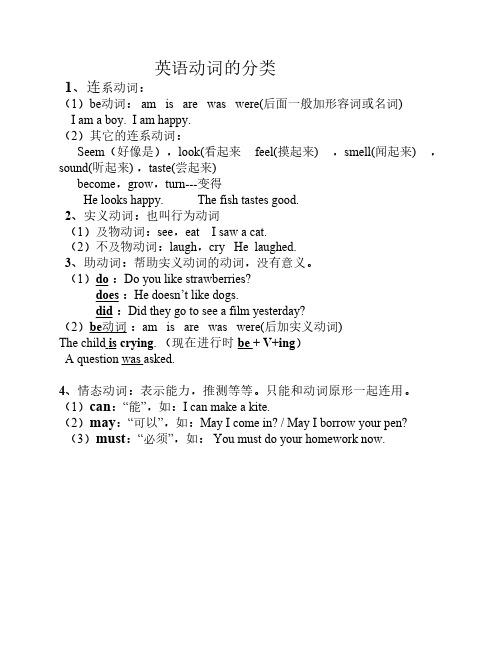
英语动词的分类
1、连系动词:
(1)be动词: am is are was were(后面一般加形容词或名词)
I am a boy. I am happy.
(2)其它的连系动词:
Seem(好像是),look(看起来feel(摸起来) ,smell(闻起来) ,sound(听起来) ,taste(尝起来)
become,grow,turn---变得
He looks happy. The fish tastes good.
2、实义动词:也叫行为动词
(1)及物动词:see,eat I saw a cat.
(2)不及物动词:laugh,cry He laughed.
3、助动词:帮助实义动词的动词,没有意义。
(1)do :Do you like strawberries?
does:He doesn’t like dogs.
did :Did they go to see a film yesterday?
(2)be动词:am is are was were(后加实义动词)
The child is crying. (现在进行时 be + V+ing)
A question was asked.
4、情态动词:表示能力,推测等等。
只能和动词原形一起连用。
(1)can:“能”,如:I can make a kite.
(2)may:“可以”,如:May I come in? / May I borrow your pen?(3)must:“必须”,如: You must do your homework now.。
动词的分类超详细解析,太太太全了,果断收藏

The children in this nurserylookvery healthy.这个托⼉所的孩⼦看起来都⾮常健康。
Keepquiet,please!请安静!,The tape recorderseemsall right.这台录⾳机好像没有⽑病。
Later hebecamea doctor.他后来成为⼀名医⽣。
The problemremainedunsolved until last year.问题到去年才解决。
[注⼀]下⾯句⼦中的come和go也是连系动词。
如:The old man's dream has come true.这位⽼⼈的梦想实现了。
Something has gone wrong with the truck.卡车出⽑病了。
[注⼆] 有些连系动词如seem, appear等后⾯常跟to be。
如:The new text seens to be easy,but actually it is rather difficult.这篇新课⽂好像很容易,其实相当难。
She appears to be the girl's sister.她似乎是那⼥孩的姐姐。
3) 情态动词情态动词有can (能),may (可以,也许),must(必须)等,表⽰能⼒、义务、必要、猜测等说话⼈的语⽓或情态。
情态动词只能和主要动词⼀起构成谓语动词。
4) 助动词助动词有shall,will,have,be,should,wonld, do等。
它们只能和主要动词⼀起构成各种时态、语态、语⽓等动词形式,以及否定和疑问等结构中的谓语动词。
3. 及物动词和不及物动词从是否能直接跟宾语来分,实义动词⼜有及物动词和不及物动词两类。
1) 及物动词后⾯必须跟宾语意义才完整的实义动词,叫做及物动词(transitive verb)。
如:Ibelievethat the committee willconsiderour suggestion.我相信委员会将会考虑我们的建议。
英语中的动词分类
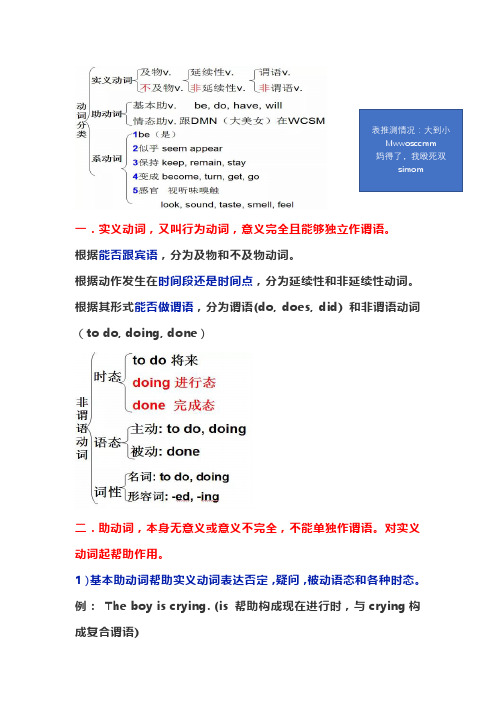
一.实义动词,又叫行为动词,意义完全且能够独立作谓语。
根据能否跟宾语,分为及物和不及物动词。
根据动作发生在时间段还是时间点,分为延续性和非延续性动词。
根据其形式能否做谓语,分为谓语(do, does, did) 和非谓语动词(to do, doing, done )二.助动词,本身无意义或意义不完全,不能单独作谓语。
对实义动词起帮助作用。
1)基本助动词帮助实义动词表达否定,疑问,被动语态和各种时态。
例: The boy is crying. (is 帮助构成现在进行时,与crying 构成复合谓语)表推测情况:大到小Mwwosccmm妈得了,我殴死双simomHe has arrived. (has帮助构成现在完成时,与arrived构成复合谓语)The house will be sold. (will帮助构成将来时,be帮助构成被动)Does he like English? (does帮助构成一般疑问句)He doesn’t have lunch at home. (does帮助构成否定句) Trees are planted in spring. (are帮助构成被动语态)2)情态助动词帮助实义动词表达说话人的情感和态度。
跟DMN(大美女)在WCSMD=dareM=must(have to)N=needWCSM=will(would), can(could), shall(should), may(might)三.系动词,用于构成主系表的基本句式。
例句:He is a teacher.Something seems wrong.He appears young.He kept silent at the meeting.This matter remains a mystery.He fell ill yesterday.People get angry easily in summer. His face went red.This kind of cloth feels very soft. This flower smells very sweet.。
专题六 动词的分类

专题六动词的分类考点聚焦一、动词概述及分类二、实义动词及用法实义动词也叫行为动词,是四类动词中唯一能独立作谓语的一类动词。
根据其句法功能可以分为及物动词和不及物动词两类。
1、及物动词及物动词本身意义不够完整,需要后接宾语才能使其意思完整。
1)动词+宾语,构成主谓宾句型。
例如:Could you please clean the blackboard? 请你擦黑板好吗?We learn English every day. 我们每天学习英语。
2)动词+直接宾语+to/for+间接宾语/ 动词+间接宾语+直接宾语,构成主谓双宾句型。
有的动词必须在后面带表示人的间接宾语和表示物的直接宾语,即两个宾语才能表达完整的意思。
例如:Who teaches you English? 谁教你们英语?Please pass me the book.= Please pass the book to me.请把那本书递给我。
My mother bought me a snow globe on my birthday.= My mother bought a snow globe for me on my birthday.我过生日时我妈买给我一个雪球。
常见的带双宾语的动词有:pass, give, bring, buy, get, leave, lend, make, cook, teach, tell, write, read, return, ask, show等。
3)动词+宾语+宾语补足语,构成主谓复宾句型。
有的动词必须在宾语后再加上形容词、副词、名词、不定式、-ing形式、介词短语等做宾语补足语,构成复合宾语,句子意思才能够表达完整。
例如:Please keep the door open. 请让门开着。
(形容词open做宾补)I often see the children play in the park。
英语动词分类大全
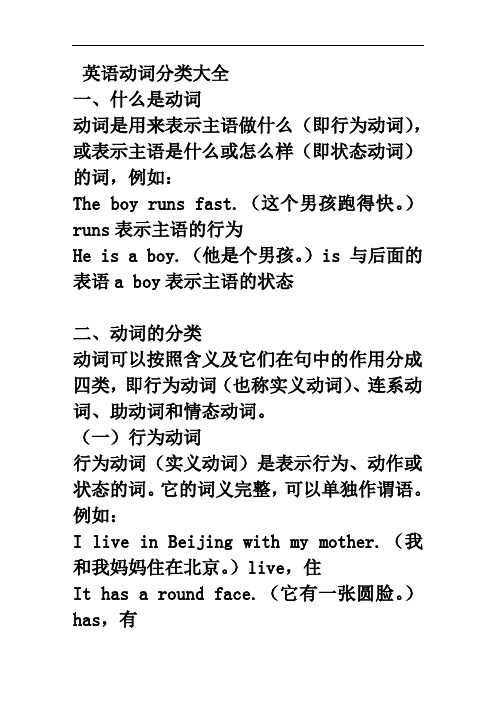
英语动词分类大全一、什么是动词动词是用来表示主语做什么(即行为动词),或表示主语是什么或怎么样(即状态动词)的词,例如:The boy runs fast.(这个男孩跑得快。
)runs表示主语的行为He is a boy.(他是个男孩。
)is与后面的表语a boy表示主语的状态二、动词的分类动词可以按照含义及它们在句中的作用分成四类,即行为动词(也称实义动词)、连系动词、助动词和情态动词。
(一)行为动词行为动词(实义动词)是表示行为、动作或状态的词。
它的词义完整,可以单独作谓语。
例如:I live in Beijing with my mother.(我和我妈妈住在北京。
)live,住It has a round face.(它有一张圆脸。
)has,有(二)连系动词连系动词是表示主语“是什么”或“怎么样”的词,它虽有词义,但不完整,所以不能单独作谓语,必须跟表语一起构成合成谓语,例如:We are in Grade Two this year.(今年我们在两年级。
)are,是are 这个词的词义“是”在句子中常常不译出。
连系动词可具体分为三类:1、表示“是”的动词be。
这个词在不同的主语后面和不同的时态中有不同的形式,is,am,are,was,were,have/has been等要特别予以注意。
例如:He is a teacher.(他是个教师。
)He was a soldier two years ago.(两年前他是个士兵。
)We are Chinese.(我们是中国人。
)2、表示“感觉”的词,如look(看起来),feel(觉得,摸起来),smell(闻起来),sound(听起来),taste(尝起来)等,例如:She looked tired.(她看一去很疲劳。
)I feel ill.(我觉得不舒服。
)Cotton feels soft.(棉花摸起来很软。
)The story sounds interesting.(这个故事听起来很有趣。
英语动词的分类及基本形式分析
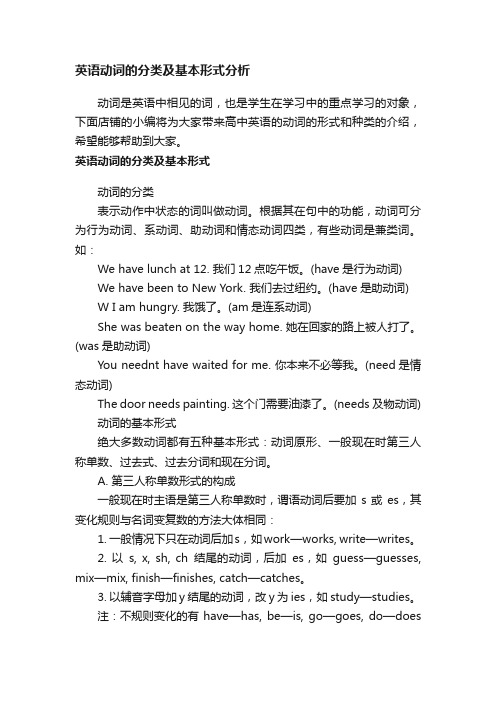
英语动词的分类及基本形式分析动词是英语中相见的词,也是学生在学习中的重点学习的对象,下面店铺的小编将为大家带来高中英语的动词的形式和种类的介绍,希望能够帮助到大家。
英语动词的分类及基本形式动词的分类表示动作中状态的词叫做动词。
根据其在句中的功能,动词可分为行为动词、系动词、助动词和情态动词四类,有些动词是兼类词。
如:We have lunch at 12. 我们12点吃午饭。
(have是行为动词)We have been to New York. 我们去过纽约。
(have是助动词) W I am hungry. 我饿了。
(am是连系动词)She was beaten on the way home. 她在回家的路上被人打了。
(was是助动词)You neednt have waited for me. 你本来不必等我。
(need是情态动词)The door needs painting. 这个门需要油漆了。
(needs及物动词) 动词的基本形式绝大多数动词都有五种基本形式:动词原形、一般现在时第三人称单数、过去式、过去分词和现在分词。
A. 第三人称单数形式的构成一般现在时主语是第三人称单数时,谓语动词后要加s或es,其变化规则与名词变复数的方法大体相同:1. 一般情况下只在动词后加s,如work—works, write—writes。
2. 以s, x, sh, ch结尾的动词,后加es,如guess—guesses, mix—mix, finish—finishes, catch—catches。
3. 以辅音字母加y结尾的动词,改y为ies,如study—studies。
注:不规则变化的有have—has, be—is, go—goes, do—does等。
B. 现在分词的构成1. 一般情况下在动词后加ing,如study—studying, work—working。
2. 以不发音的字母e结尾的动词,先去掉e再加ing,如write—writing, move—moving。
英语动词的分类与讲解

英语动词的种类◆提示:以下动词的分类并没有绝对的标准。
有的分类只是为了更好地学习英语动词、掌握动词的用法和搭配,以及更好地学好与动词有关的语法。
◆切记:有些动词作不同的意义解释时可以分属于不同种类的动词。
因此,我们要特别注意一词多义现象。
1.实义动词实义动词是指具有完整意义,可以单独作谓语的动词,主要表示主语的动作、状态和品质。
实义动词也可与助动词相结合表示更加复杂的动词意义。
实义动词主要包括及物动词和不及物动词两类。
〔1〕不及物动词不及物动词指的是后面不能跟宾语的动词。
在英语中大多数动词既可作及物动词,又可作不及物动词。
纯不及物动词很少。
常见的不及物动词有:apologize 抱歉appear 出现arrive 到达e 来go 去run 跑walk 走die 死fall 掉flow 流淌happen 发生rise 升起、站起stay 呆、留sit 坐lie 躺stand 站cry 哭swim 游泳e.g.Let's go. 我们走吧!〔2〕及物动词能跟宾语的动词称为及物动词。
可分为跟单宾语的及物动词、跟双宾语的及物动词、跟复合构造的及物动词等。
①常见的只跟单宾语的及物动词accept 承受borrow 借bury 埋cover 覆盖defeat 挫败discover 发现enjoy 喜欢excite 使冲动interest 使感兴趣please 使快乐put 放worry 担忧surprise 使凉讶forget 忘记guess 猜测love 热爱use 运用e.g.Don’t forget to wake me up at six tomorrow morning.别忘了明天早晨六点叫醒我。
You can borrow one book at a time from the library.在图书馆一次只能借一本书。
②常见的跟双宾语的及物动词A.指人的间接宾语在指物的直接宾语后面需加to的动词:bring 带来give 给hand 递pass 递pay 付款post 寄promise 容许read 读return 返还sell 卖show 表现teach 教tell 告诉wish 祝愿offer 提供e.g.I returned him the storybook.(可变为I returned the storybook to him.)我已把故事书还给他了。
英语动词分类及用法表
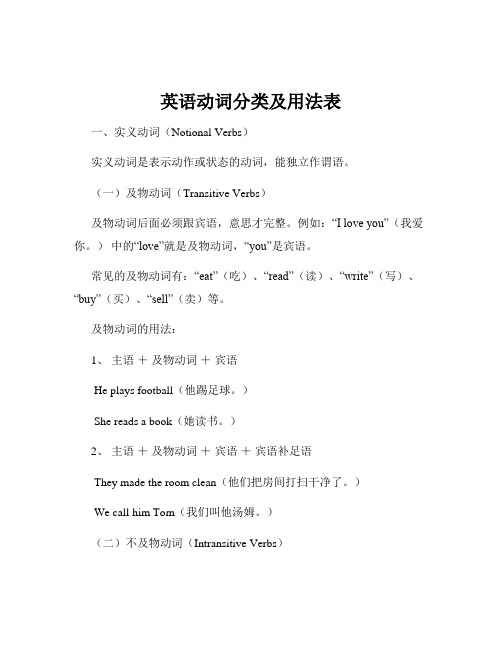
英语动词分类及用法表一、实义动词(Notional Verbs)实义动词是表示动作或状态的动词,能独立作谓语。
(一)及物动词(Transitive Verbs)及物动词后面必须跟宾语,意思才完整。
例如:“I love you”(我爱你。
)中的“love”就是及物动词,“you”是宾语。
常见的及物动词有:“eat”(吃)、“read”(读)、“write”(写)、“buy”(买)、“sell”(卖)等。
及物动词的用法:1、主语+及物动词+宾语He plays football(他踢足球。
)She reads a book(她读书。
)2、主语+及物动词+宾语+宾语补足语They made the room clean(他们把房间打扫干净了。
)We call him Tom(我们叫他汤姆。
)(二)不及物动词(Intransitive Verbs)不及物动词本身意义完整,后面不需要跟宾语。
例如:“The bird flies”(鸟飞。
)中的“flies”就是不及物动词。
常见的不及物动词有:“sleep”(睡觉)、“run”(跑)、“swim”(游泳)、“laugh”(笑)、“cry”(哭)等。
不及物动词的用法:1、主语+不及物动词The sun rises(太阳升起。
)It rains(下雨了。
)二、系动词(Linking Verbs)系动词用于连接主语和表语,表示主语的身份、性质、状态等。
常见的系动词有:1、状态系动词:be(am/is/are/was/were)I am a student(我是一名学生。
)They were happy(他们曾经很开心。
)2、持续系动词:keep, remain, stayHe always keeps silent(他总是保持沉默。
)The weather remains cold(天气仍然很冷。
)3、表象系动词:seem, appearShe seems tired(她看起来很累。
四类动词(实义动词、系动词、助动词、情态动词)的用法讲解-高考英语语法总复习

四类动词(实义动词、系动词、助动词、情态动词)的用法讲义2022届高考英语语法总复习实义动词的用法实义动词的概念实义动词是表示动作或状态,有完整意义,能在句中独立作谓语的动词They eat a lot of potatoes.他们吃了大量土豆。
根据词尾是否接宾语实义动词可分为及物动词(vt.)和不及物动词( vi. )及物动词及物动词是指后面带有宾语的动词,其后要接宾语,意义才完整宾语通常由名词、代词、动词-mg形式、动词不定式等构成He always does his homework at home.他总是在家里做作业。
I have lunch at school every day.我每天在学校吃午饭。
用法:1、及物动词可用于被动语态中The work has been finished for two hours.这项工作已经完成两个小时了。
The cup was broken by my brother.茶杯被我弟弟打破了。
2、及物动词可以有直接宾语、间接宾语或复合宾语He passed me the ball.他把球传给我了。
Keep the classroom clean and tidy.保持室内干净、整洁。
注意:常见的能带双宾语的动词有:bring, buy, cook, draw, find, get, hand, leave, end make, offer. pass, pay, read, return, sell, show, each, tell write, etc.不及物动词不及物动词本身意思完整,其后无需跟宾语实例:He spoke at the meeting.他在会上发了言。
Don't look for an excuse.别找借口了。
注意:很多动词既可用作及物动词又可作不及物动词如何区别它们,就看它们后面是否直接接名词作宾语He studies English very hard.他非常努力地学习英语。
关于英语中四类动词的科普

关于英语中四类动词的科普动词所代表的具体内容,千差万别,但是从“体”的角度来划分,大体上可以分成四类。
这是匈牙利裔加拿大语言学家Zeno Vendler (1921—2004) 在1967 年提出来的,至今尽管经过许多人的修改补充,仍然大体上为语言学界所公认。
这四类是:状态动词(states),例如:know, love, have, want, belong, contain, exist, possess等;活动动词(activities),例如:walk, swim, play, write, read, listen, rain等;趋成动词(accomplishments,国内有译为“终结动词”的,但这个名称容易同第四类“达成动词”混淆),例如:build, persuade, prepare, get ready, recover, grow up等;达成动词(achievements),例如:kill, drop, catch, arrive, find, lose, receive, explode 等。
前面已经指出过,我们所说的动词单词,不一定只由一个光秃秃的动词所组成,有时候也可以带有其他语义成分。
这一来,有些动词,单独一个,属于某一类;加上其他语义成分,就可能转到另一类。
例如use(使用)原来是第二类动词,但是use up(用完)就变成了第四类;又例如take本来是第四类动词,但是take pride in(以…为荣)就变成了第一类动词。
有些动词,本来是这个意思,加上别的成分,表面上看来,还是这个动词,但是实际上词义和类别已经根本改变了,例如:run(跑;管理)单独是第二类动词,但是run into (somebody)(遇到,碰到)却获得了新的词义,而且转到了第四类。
状态动词“状态动词”,代表一种无变化的延续状态。
最典型的动词就是know。
但是有人认为know有特殊性,不够典型,因为人除非患了失忆症,know就只有时段的起点,没有终点。
- 1、下载文档前请自行甄别文档内容的完整性,平台不提供额外的编辑、内容补充、找答案等附加服务。
- 2、"仅部分预览"的文档,不可在线预览部分如存在完整性等问题,可反馈申请退款(可完整预览的文档不适用该条件!)。
- 3、如文档侵犯您的权益,请联系客服反馈,我们会尽快为您处理(人工客服工作时间:9:00-18:30)。
英语动词分类1.1 概说表示动作和状态的词叫做动词。
如:work 工作study 学习swim 游泳travel 旅行1.2 动词分类1.2.1 根据其在句中的功能,动词可分为四类①实义动词(Notional Verb)表示行为、动作或状态的词。
它的词义完整,可以单独作谓语。
如:plan learn eat beat②系动词(Link Verb)表示主语“是什么”或“怎么样”的词,它虽有词义,但不完整,所以不能单独作谓语,必须跟表语一起构成合成谓语。
如:be keep feel get系动词具体可分为五类:1)表示“是”的状态动词,如be, keep, remain, stay, lie, stand。
例如:He is a teacher.He was a soldier two years ago.We are Chinese.The weather remains cold.Why he left remains a secret.2)表示“感官”的词,如look, feel, smell, sound, taste, 例如:She looked tired.Cotton feels soft.The story sounds interesting.The flowers smell sweet.The mixture tasted horrible.3)表示“变”的动词,如become, get, grow, turn,例如:She became a college student.He feels sick. His face turns white.The weather gets warmer and the days get longer when spring comes.He grew old.4)表“似乎”的动词,如look, seem, appear,例如He looks happy.He seemsvery sad.5)表“终止”的动词,如prove, turn outHis rumor proved false.The search proved difficult.His plan turned out a success.注意区别以下一些动词的用法,它们既可以作为实义动词,又可以作为系动词。
lookHe is looking at the picture.It looks beautiful.feelI felt someone touch my arm.Are you feeling better today than before?My little brother likes to smell the apple before he eats it.Great! The flowers smell nice.soundThe letter “h” in hour is not sounded.The gun sounded much closer.tastePlease taste the soup.The soup tastes terrible.getThere are some bananas on the table. Each of you can get one.The situation is getting worse.growDo you grow rice in your country?It’s too late. It’s growing dark.turnThe earth turns around the sun.When spring comes, the trees turn green and the flowers come out.辨别是实义动词还是系动词有一个最简便的方法,即用系动词be替换句子中的这些动词,句子仍然成立就是连系动词;反之,就是实义动词。
例如:The trees turn/are green when spring comes.The earth turns around the sun.③助动词(Auxiliary Verb)本身无词义,不能单独作谓语,只能与主要动词一起构成谓语,表示不同的时态、语态、表示句子的否定和疑问,强调,如:have do beHe does not speak English well.A dog is running after a cat.Did he have any milk and bread for his breakfast?My grandparents will come next week.④情态动词(Modal Verb)本身虽有意义,但不完整。
它们表示说话人的能力、说话人的语气或情态,如“可能”、“应当”等。
这类动词有can, may, must, need, dare, could, might等。
它们不能单独作谓语,必须与实义动词原形一起作谓语,表示完整的意思,如:can may will would shouldI can dance.He can’t walk because he is a baby.May I come in?1.2.2 根据其在句中的用法,动词还可分为及物动词和不及物动词①及物动词vt.及物动词是必须带宾语的动词,可分为如下三类。
1) 及物动词+宾语例:I love my home.He buys an English dictionary.2) 及物动词+间接宾语+直接宾语例:She teaches us maths.My mother gives me a new pen.Show me your pen.常用的能接双宾语的及物动词有:give, teach, buy, find, leave, sell, show, read, bring, cook 等。
3)及物动词+宾语+宾补例:They named their son David.及物动词后如果要跟动词,要么跟不定式,要么跟动词的-ing形式。
②不及物动词vi.本身意义完整,后面不须跟宾语的实义动词,叫做不及物动词。
如:Birds can fly.My watch stopped.The bell rings at eight.不及物动词后面常接介词,再加宾语。
如:go,come, listen。
We go to the bus station at noon.Everybody listened to the teacher with great interest.不及物动词没有被动形式,常常主动表被动,不及物动词+ (well, poorly, easily)happen, occur, rise, lie, diesell, wash, burn, cook, cut, drive, dress, play, last, open, write, start, run, read, operate, break, measure, weighDry wood burns easily.The cloth washes well.1.2.3 根据是否受主语的人称和数的限制分为:①限定动词(Finite Verb)/谓语动词,如:She sings very well.②非限定动词(Non-finite Verb)/非谓语动词英语中共有三种非限定动词1)不定式(Infinitive)表“目的或将来”如: to see to help,a.作主语侧重于动作的具体性和将来性To play basketball is a great pleasure.但为使句子平衡,常用it 代它作主语, 把它移到句子后部去.It is a great pleasure to play basketball.b.作宾语跟在动词或疑问词之后常跟不定式作宾语的动词:hope, want , expect, wish, desire, like, love, dislike ,hate, plan, intend, mean, prepare, decide, determine, afford, fail, manage, try、dare, help , promise、refuse、learn、offer、agree、forget,bother疑问词之后:what to do when to start where to go how to live c.作表语∙表示按计划和安排将要发生的事情He is to marry Rose.∙表示主语的内容,但侧重于目的性。
Her wish was to become an artist.∙表示情态意义(应该, 必须)。
The form is to be filled in and returned within a week.She is to blame.d.作定语Charles Lindbergh is the first man to fly the Atlantic alone She has a good chance to go to college.He has got lots of questions to ask.There is nothing to worry about.e.作宾语补足语They got us to go with them.The chairman requested the members to be silent.The guard forbade me to enter.Many parents expect their children to study abroad.f.作状语Tim sat near the fire to get warm.The athletes practised hard to win the match.I need a pen to write with.He is looking for a room to live in.2)现在分词(Present Participle)表“主动或进行”如stolen openinga.作主语(也叫动名词)Seeing is believing.Playing chess is fun.It's no use waiting here.It is no use/ no good/ fun / a waste of time/a good pleasure 等名词+ doing sth. It is useless/ nice/ good/ interesting/ worthwhile 等形容词+ doing.作表语The news is very disappointing.His story is very moving.(Encouraging, inspiring, exciting, interesting….)b.作定语Don’t wake up the sleeping boy.= Don’t wake up the boy who is sleepingI don’ t know the man writing something over there.=I don’ t know the man who is writing something over there.a racing car= a car that is used to racea swimming pool= a pool that is used to swim inDo you know the sleeping car on show?The boy sitting under the tree is reading.作宾语动词后的宾语:suggest, finish, avoid, stop, can’t help, mind, enjoy, require, practise, miss, escape, pardon, advise, consider, imagine, keep, appreciate, escape, permit。
